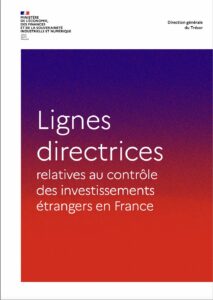
Presentation of the Amendments to the IEF Guidelines between 2022 and 2025
The 2025 IEF Guidelines represent the primary tool for assisting foreign investors and their counsel in understanding the French regime for the screening of foreign direct investments in France (IEF). This 2025 edition follows the first release of September 2022 and incorporates substantial updates reflecting regulatory changes, the administration’s practical experience, and adaptation to new economic security priorities.
This presentation aims to detail all amendments to the IEF Guidelines, section by section, highlighting additions, deletions, and reorganizations. The term IEF Guidelines is deliberately repeated throughout to emphasize its importance.
General Context and Purpose of the Revision
The 2025 IEF Guidelines were adopted in a context marked by several legislative and regulatory developments:
-
The entry into force of Decree No. 2023-1293 of 28 December 2023 and the related Ministerial Order on foreign investments in France;
-
The gradual alignment of French practice with European requirements, in particular through the implementation of Regulation (EU) 2019/452 on the screening of foreign direct investments;
-
The adaptation to new economic security priorities, such as the protection of critical raw materials, strategic technologies, and so‑called vital importance activities.
The primary purpose of revising the IEF Guidelines is to provide foreign investors with a clearer, more educational, and operational framework. The structural changes are significant, focusing on the scope of control, authorization and pre‑screening procedures, sensitive activities, exemptions, and the sanctions regime.
Changes to the Scope of Application
The most notable change is the broadening of the definition of foreign investments subject to screening. While the 2022 IEF Guidelines distinguished three main categories:
-
The acquisition of control of a French‑law entity;
-
The acquisition of all or part of a business line (branche d’activité);
-
The crossing of certain voting rights thresholds (25%, with a temporary 10% threshold for sensitive listed companies since 31 December 2022);
The 2025 IEF Guidelines introduce a fourth category:
-
The acquisition of control of an establishment registered with the French Trade and Companies Register (RCS).
This innovation, derived from Decree No. 2023‑1293, addresses a previously identified legal gap: branches or stand‑alone establishments could escape screening if they were not incorporated as separate French entities.
Moreover, the 2025 IEF Guidelines now clarify that the acquisition of a foreign‑law entity holding an RCS‑registered establishment in France is also subject to prior authorization. This reflects the State’s intention to strengthen control over indirect transactions.
Sensitive Activities and Scope of Protection
Sensitive activities, as defined in Article R. 151‑3 of the French Monetary and Financial Code, have been significantly revised since 2022. The 2025 IEF Guidelines introduce several adjustments:
-
Updated list of dual‑use goods and technologies, now aligned with Regulation (EU) 2021/821;
-
Inclusion of critical raw materials, consistent with Regulation (EU) 2024/1252, covering lithium, cobalt, rare earths, nickel, and tungsten;
-
Clarification of eligibility criteria, distinguishing:
-
Objective eligibility (activities inherently sensitive),
-
Eligibility by convergence of indicators (activities essential for security), and
-
R&D eligibility (research activities potentially enhancing future strategic capacities).
-
Compared with the 2022 IEF Guidelines, the addition of critical raw materials and the expanded coverage of key technologies—such as cybersecurity, AI, quantum computing, and semiconductors—represent a notable extension of the protection perimeter.
Exemptions and Carve‑Outs
The exemptions from the obligation to seek prior authorization have been reorganized in the 2025 IEF Guidelines. The text now distinguishes two main categories:
-
Intra‑group exemptions, where the ultimate investor already controls the target entity within the meaning of Article L. 233‑3 of the French Commercial Code;
-
Exceptions to the exemption, applicable where:
-
The transaction prevents compliance with prior authorization conditions; or
-
The transaction aims to transfer a sensitive business line abroad.
-
This simplified framework replaces the three‑tier scheme in the 2022 IEF Guidelines, which differentiated intra‑group transactions, threshold crossings after an authorized control, and control acquisitions following threshold crossings.
Procedure and Review Timelines
The 2025 edition modernizes procedural aspects:
-
Submission of applications: use of the digital IEF platform is now mandatory, replacing the former email or postal submission options;
-
Completeness of files: explicit reference to Article L. 114‑5 of the French CRPA, suspending timelines until missing documents are provided;
-
Phase 1 and Phase 2: improved guidance on opening the supplementary review phase and differentiating between suspensive (Phase 1) and non‑suspensive (Phase 2) information requests.
These evolutions in the IEF Guidelines demonstrate a commitment to professionalizing and securing procedural timelines.
Enforcement Measures and Sanctions
The 2025 IEF Guidelines strengthen the enforcement regime:
-
Clear reminder of automatic civil nullity for investments made without authorization;
-
Detailed description of injunction powers and interim measures, including suspension of voting rights, appointment of a trustee, and temporary prohibition to dispose of sensitive assets;
-
Specification of financial penalties reaching up to twice the investment value or 10% of turnover;
-
Explicit reference to criminal sanctions under Article 459 of the French Customs Code.
While such measures existed in the 2022 IEF Guidelines, the 2025 edition elaborates on them to provide a more dissuasive and transparent framework.
Alignment with the European Framework
The 2025 IEF Guidelines reinforce:
-
Cooperation between Member States and the European Commission under Regulation (EU) 2019/452;
-
Integration of EU‑level priorities regarding the protection of critical technologies and raw materials.
This harmonization underscores France’s role as an active Member State in the EU’s FDI screening system.
Conclusion and Practical Implications
In summary, the 2025 IEF Guidelines provide:
-
An expanded scope covering new situations (RCS‑registered establishments);
-
Modernized, fully digitalized procedures;
-
Clearer exemptions and exceptions;
-
An updated list of sensitive activities, including critical raw materials;
-
A reinforced sanctions regime and deeper European cooperation.
These developments serve a dual purpose: enhancing economic security while offering investors a clear and predictable framework. The 2025 IEF Guidelines thus constitute a strategic tool for companies and their counsel, reflecting France’s commitment to safeguarding its national interests.
Reminder: 2022 Guidelines on Foreign Investment Screening in France
The guidelines on foreign investment screening in France form the foundation of a robust legal framework established to safeguard the country’s essential interests in terms of national security, public order, and sovereignty. This mechanism relies on a careful balance between openness to foreign investment and the protection of strategic sectors. To this end, French authorities have implemented a coherent set of rules and procedures to govern investment transactions that may affect assets deemed sensitive.
These guidelines are critical for understanding and implementing France’s foreign investment screening (IEF), as defined by Articles L.151‑3 and R.151‑1 et seq. of the French Monetary and Financial Code. They provide both domestic and international investors with a clear and predictable framework, enabling them to anticipate regulatory requirements, secure transactions, and minimize the risk of legal disputes.
Compatibility of France’s Foreign Investment Screening with European Union Law
The principle of free movement of capital, enshrined in Article 63 of the Treaty on the Functioning of the European Union (TFEU), underpins EU economic policy. By default, cross‑border investments are permitted and encouraged. However, Articles 64, 65, and 346 TFEU allow Member States to introduce restrictions for imperative reasons of public order or national security.
France relies on these exceptions to shape its foreign investment screening guidelines. Accordingly, certain transactions—particularly those involving companies active in defense, critical infrastructure, or dual‑use technologies—may require prior authorization from the Ministry of the Economy.
Scope of Application Defined by the Guidelines
The 2022 guidelines on foreign investment screening in France clearly outline the conditions under which an investment is subject to authorization:
a) Investor Status
They apply to both foreign natural persons and legal entities controlled by foreign interests. The guidelines also detail the notion of a “control chain,” which is essential in determining the foreign character of an investor, including within complex structures such as investment funds.
b) Nature of the Investment
Screening is not limited to acquisitions of majority stakes. Crossing certain voting‑rights thresholds (notably 25%, or 10% on a temporary basis for sensitive listed companies) or acquiring a business unit can trigger screening. These thresholds are themselves the subject of interpretative guidance updated regularly.
c) Sensitive Activities
The list of activities covered by IEF screening appears in Article R.151‑3 of the Monetary and Financial Code. It includes defense, energy, transportation, water, healthcare, electronic communications, research, and artificial intelligence. The guidelines provide clarification on the scope of these sectors and borderline cases.
Guidelines as a Tool to Secure Investment Transactions
Given the increasing complexity of global value chains and sophisticated financial structures, French authorities have issued practical guidelines for investors and their counsel. These documents specify the administration’s expectations regarding transparency, documentation, and transaction conduct.
Key elements include:
-
Filing Requirements: Submission format, language, and supporting documents are standardized to expedite review.
-
Procedural Timeline: Screening involves two successive phases: an initial 30‑day review allowing for fast‑track clearance, followed by a 45‑day in‑depth review if necessary. The guidelines detail each step and associated deadlines.
-
Transparency and Good‑Faith Obligations: All transactions must be declared honestly. Administrative and criminal penalties may apply in cases of fraud or failure to comply with authorization conditions.
-
Exemptions and Waivers: Certain intra‑group transactions or threshold crossings resulting from previously authorized operations may be exempt. The guidelines clearly identify these scenarios and their conditions.
-
Post‑Authorization Monitoring: Commitments made as part of the authorization process must be documented and may be revised if necessary. The guidelines also clarify notification duties for any subsequent corporate changes.
Integration with European Union Initiatives
The implementation of Regulation (EU) 2019/452 on the screening of foreign direct investments marked a major step toward building a shared framework for economic sovereignty within the EU. This regulation introduced cooperation mechanisms between Member States, supported by common guidelines, to enable information sharing and coordinated risk assessments.
France, as a leading participant in this initiative, has aligned its national system with these European requirements, thereby reinforcing coherence between its domestic guidelines and EU expectations. This coordination is particularly relevant for cross‑border transactions involving multiple EU entities or common strategic sectors.
Guidelines as a Pillar of Economic Security
France’s foreign investment screening regime is not static. It continuously adapts to evolving economic, technological, and geopolitical dynamics. For this reason, the guidelines are regularly updated by the Directorate General of the Treasury to reflect:
-
The inclusion of new sensitive sectors (e.g., quantum technologies, big data, cybersecurity);
-
Changes in control thresholds or criteria for determining strategic importance;
-
The introduction of new documentation and reporting obligations.
These guidelines thus serve as a forward‑looking tool, reflecting the State’s intention to maintain open dialogue with investors while effectively protecting national interests.
A Structured Legal Architecture for Sovereignty
France’s foreign investment screening mechanism is built on a clear legal architecture, combining EU law, national legislation, and precise administrative guidelines. It is a vital lever for protecting economic sovereignty in an increasingly competitive and unstable global environment.
The guidelines are not merely informative: they actively shape practices, secure procedures, promote transparency, and facilitate compliance. Any foreign company intending to invest in a sensitive sector in France will benefit from consulting the 2022 foreign investment screening guidelines at the earliest stage of the process.
2025 Guidelines of the French Ministry of the Economy
2025 Guidelines on Foreign Investment Screening in France (IEF)

Our Expertise
Relians, a strategic and institutional advisory firm, has been assisting companies facing these challenges for over 20 years. Leveraging a thorough understanding of the applicable legal framework, administrative practices, and official guidelines, we help our clients structure their transactions securely, in full compliance with regulatory requirements, and within a framework of constructive dialogue with the French authorities.
Relians – Specialist in Foreign Investment Screening in France (IEF)

